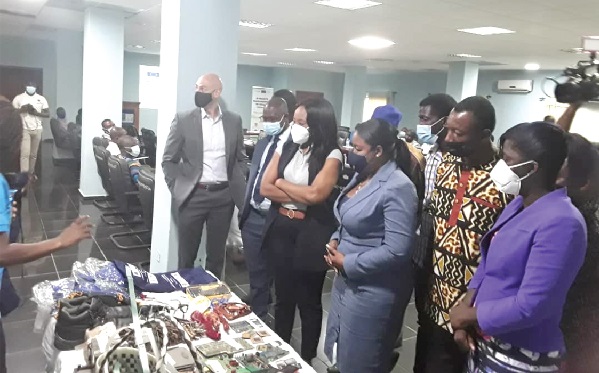
E-waste operators educated on access to finance
The formalisation of activities in the e-waste industry has created direct jobs for an estimated 20,000 to 35,000 people, with 120,000 depending indirectly on the industry.
According to the observation of implementers of the European Union-funded Electrical and Electronic Waste Management in Ghana (E-MAGIN) project, the beneficiaries included scrap dealers, general e-waste scrap dealers, technicians, electronic services technicians, collectors and recyclers.
Advertisement
This came to light at a two-day workshop in Accra last Monday for operators in the e-waste sector on access to finance for sound e-waste management.
The workshop, which was to assess the progress and discuss access to finance, brought together selected micro small, and medium-sized enterprises (MSMEs) in the e-waste sector across the country.
Participants in the workshop included the Scrap Dealers Association, General E-Waste Scrap Dealers Association, National Air-conditioning Refrigeration Workshop Owners Association (NARWOA), and Ghana Electronic Services Technicians Association (GESTA), among other collectors and recyclers.
Some financial service providers and the administrator of the Electrical and Electronic Waste Management Fund shared with the participants financial facilities that could be accessed by operators in the e-waste industry.
The workshop was also used as a platform for connecting MSMEs under the e-waste sector at the national level to financiers and also discuss the economics of establishing collection centres or take back systems.
Project
The E-MAGIN Project Coordinator, Professor Rosemond Boohene, said in the past three years, the E-MAGIN project had been backing the effective implementation of the Hazardous and Electronic Waste Control Management Act, 2016 (Act 917) by supporting the formalisation of informal stakeholders.
Also, she said the project was aimed at supporting the establishment of a nationwide collection mechanism, conducting training and capacity-building programmes, and providing decision support to policymakers through dialogue events, studies and policy briefs.
Prof. Boohene said following the introduction of the Act 917, the Legal Instrument LI 2250 and the technical guidelines on environmentally sound e-waste management, informal workers were required to formalise their operations by registering with state authorities to enable them to move under the ambit of the law.
"A core objective of the E-MAGIN project was to support informal MSMEs to formalise by forming associations, registering with public authorities and acquiring tax identification numbers,” she said.
The project, the coordinator explained, was to ensure sound collection, dismantling and recycling of discarded electronic, electrical and equipment waste.
Drawback on waste management
The Head of the Fund Operations Unit of the Electrical and Electronic Waste Management Fund, Ms Viva Bruce, said the current e-waste management in the country was plagued with a number of drawbacks such as the indiscriminate disposal of electrical and electronic equipment.
She said practices such as the burning of cables also released toxic chemicals into the atmosphere and led to the contamination of water and soil surfaces with heavy metals.
In addition to the crude means of extracting valuable metal from electrical and electronic equipment there was also the lack of proper recycling and treatment plants.
The E-Waste Act
In response to these drawbacks, Ms Bruce said the government introduced Act 917 to offer the legal framework for the sustainable management of electrical and electronic waste in the country.
The act creates a fund (E-waste Fund) to provide finance for the management of electrical and electronic waste and reduce the adverse impact on human life and the environment.
Funds are generated through levies such as the advance Eco levy, grants, donations and gifts, and funds approved by Parliament.
Collected funds are used to facilitate implementation, monitoring and enforcement of the legal framework and support the formalisation of informal actors.
Support
The Administrator of the E-waste Fund, Ms Nana Afua Ababio, encouraged the participants to reflect on the practical opportunities under the new legal regime.
An official from Cal Bank Green Financing Desk, Mr Abraham Dsane, said the bank had partnered an agency to design a special purpose financing programme to support sustainable energy projects and enterprises whose activities had an impact on the environment.



